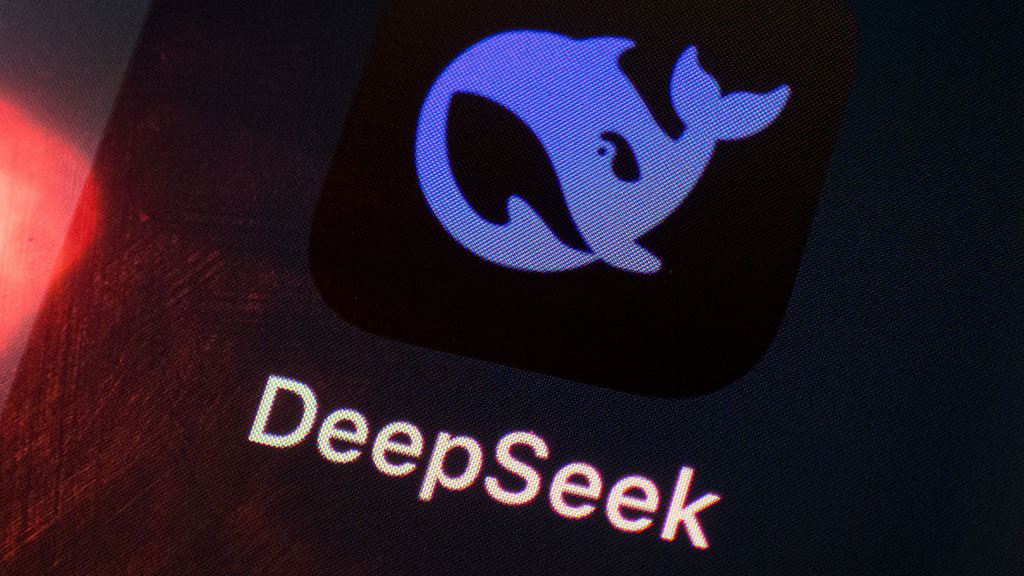China's DeepSeek AI is a 'Sputnik moment' for the US
The US is facing a new “Sputnik moment” with the sudden appearance of China's DeepSeek AI firm wiping $1 trillion off the value of US tech stocks.

Get the latest financial news, insights and expert analysis from our award-winning MoneyWeek team, to help you understand what really matters when it comes to your finances.
You are now subscribed
Your newsletter sign-up was successful
Want to add more newsletters?

Twice daily
MoneyWeek
Get the latest financial news, insights and expert analysis from our award-winning MoneyWeek team, to help you understand what really matters when it comes to your finances.

Four times a week
Look After My Bills
Sign up to our free money-saving newsletter, filled with the latest news and expert advice to help you find the best tips and deals for managing your bills. Start saving today!
The US is facing a new “Sputnik moment”. In 1957 the Soviet Union shattered US complacency by becoming the first country to launch an artificial satellite into space. In 2025, DeepSeek, a Chinese artificial intelligence (AI) start-up, has again upended illusions of US tech leadership, wiping the “smug grin” off the faces of Silicon Valley billionaires in the process, says Tom Leonard in the Daily Mail. DeepSeek has launched a model that matches the performance of the best US chatbots, but at much lower cost. America’s OpenAI, led by Sam Altman, has spent $1 billion training various versions of ChatGPT, but DeepSeek says it paid less than $5.6 million to build a comparably good chatbot.
DeepSeek wipes $1 trillion off US tech shares
The DeepSeek fallout wiped $1 trillion off US tech shares on Monday 27 January, with Nvidia especially hard hit (see below). US utility and energy stocks also sold off – less electricity is needed to power leaner AI models such as DeepSeek. DeepSeek’s efficient performance has made investors in US tech question why they are being asked to spend billions of dollars on generative AI when China can do it for so much less, says Dan Romanoff for Morningstar.
The Chinese chatbot is a “direct” consequence of Western sanctions that have limited China’s access to high-end computer chips, says Angela Zhang in the Financial Times. Deprived of ready computing power, the country’s engineers have been forced to innovate, experimenting with “novel approaches” to do more with less. The “wonder of the Cold War” was that the impoverished Soviet Union stayed in the game for so long “thanks to the inventiveness of its engineers”, says Andrew Orlowski in The Telegraph. Something similar could be happening again. An “abundance of cheap capital” has made US tech firms lazy and wasteful.
MoneyWeek
Subscribe to MoneyWeek today and get your first six magazine issues absolutely FREE

Sign up to Money Morning
Don't miss the latest investment and personal finances news, market analysis, plus money-saving tips with our free twice-daily newsletter
Don't miss the latest investment and personal finances news, market analysis, plus money-saving tips with our free twice-daily newsletter
Until now, Silicon Valley venture capitalists had hoped that the AI boom would be a battle for market dominance that yielded a handful of super-profitable monopolists. But if producing new AI is this easy then that assumption vanishes. Wall Street is starting to ask how AI will create “any value” at all for investors. DeepSeek undermines “one of the core tenets of the AI bull market”, agrees Louis-Vincent Gave in The Spectator. It had been thought that by spending vast amounts on AI chips and data centres, US tech giants could build unassailable moats around the new technology, locking in huge future profits for themselves. Now it looks as though “the hundreds of billions spent” by US Big Tech might “never see any returns”. It’s Silicon Valley’s “metaverse fiasco all over again”.
Talk of the end of the AI boom is “excessive”, says Dan Gallagher in The Wall Street Journal. Some question whether DeepSeek’s model was really built as cheaply as is claimed. More fundamentally, fiercer competition from China is unlikely to cool US interest in AI. There is no sign yet that Big Tech is cutting its AI spending, with Meta targeting as much as $65 billion in capital spending this year; the recently announced “Stargate Project” aims to raise as much as $500 billion. “The AI spending war might just be entering a new phase.”
Does DeepSeek mean the end of the US AI boom?
Nvidia’s shares plunged 17% on Monday 27 January, losing $593 billion for the worst one-day loss of market value in Wall Street history. The shares rallied on Tuesday 28 January by almost 9%, but remain off 6% since the start of the year.
Nvidia has been the darling of the AI boom, with its graphics processing units (GPUs) in demand to power AI data centres. Yet DeepSeek has upended the assumption that the “best way to make models smarter is by giving them more computing power”, says Mark Sullivan for Fast Company. Investors are thus questioning whether promises of “unlimited demand for the most powerful AI chips in the future” will really materialise.
Nvidia’s most advanced chips reportedly enjoy gross margins of more than 90%, says The Economist. If fewer chips are needed to power cutting-edge AI, then demand for Nvidia’s processing power could fall short. Competition from rival chipmakers is also growing. Nvidia may remain dominant, but its market share and margins are set for a fall.
DeepSeek could ultimately prove more of a blessing than a curse for Nvidia, says Asa Fitch in The Wall Street Journal. AI bulls point to “Jevons paradox” – efficiency gains often cause total resource consumption to rise rather than fall (fuel-efficient engines give more people an incentive to run a car, for example). By bringing the AI operating costs down, long-term demand for AI products and chips may only grow.
Worries about valuations for US tech have been growing in the background even as the AI boom has powered on, says Richard Abbey on Bloomberg. DeepSeek has offered the “catalyst” that some were looking for to knock down overly optimistic ratings. Indeed, a market “rotation” away from tech may now be underway on Wall Street, with US consumer staple stocks outperforming the big tech names since the November election.
This article was first published in MoneyWeek's magazine. Enjoy exclusive early access to news, opinion and analysis from our team of financial experts with a MoneyWeek subscription.
Get the latest financial news, insights and expert analysis from our award-winning MoneyWeek team, to help you understand what really matters when it comes to your finances.
Alex is an investment writer who has been contributing to MoneyWeek since 2015. He has been the magazine’s markets editor since 2019.
Alex has a passion for demystifying the often arcane world of finance for a general readership. While financial media tends to focus compulsively on the latest trend, the best opportunities can lie forgotten elsewhere.
He is especially interested in European equities – where his fluent French helps him to cover the continent’s largest bourse – and emerging markets, where his experience living in Beijing, and conversational Chinese, prove useful.
Hailing from Leeds, he studied Philosophy, Politics and Economics at the University of Oxford. He also holds a Master of Public Health from the University of Manchester.
-
 Can mining stocks deliver golden gains?
Can mining stocks deliver golden gains?With gold and silver prices having outperformed the stock markets last year, mining stocks can be an effective, if volatile, means of gaining exposure
-
 8 ways the ‘sandwich generation’ can protect wealth
8 ways the ‘sandwich generation’ can protect wealthPeople squeezed between caring for ageing parents and adult children or younger grandchildren – known as the ‘sandwich generation’ – are at risk of neglecting their own financial planning. Here’s how to protect yourself and your loved ones’ wealth.
-
 Three key winners from the AI boom and beyond
Three key winners from the AI boom and beyondJames Harries of the Trojan Global Income Fund picks three promising stocks that transcend the hype of the AI boom
-
 RTX Corporation is a strong player in a growth market
RTX Corporation is a strong player in a growth marketRTX Corporation’s order backlog means investors can look forward to years of rising profits
-
 'AI is the real deal – it will change our world in more ways than we can imagine'
'AI is the real deal – it will change our world in more ways than we can imagine'Interview Rob Arnott of Research Affiliates talks to Andrew Van Sickle about the AI bubble, the impact of tariffs on inflation and the outlook for gold and China
-
 Three companies with deep economic moats to buy now
Three companies with deep economic moats to buy nowOpinion An economic moat can underpin a company's future returns. Here, Imran Sattar, portfolio manager at Edinburgh Investment Trust, selects three stocks to buy now
-
 Should you sell your Affirm stock?
Should you sell your Affirm stock?Affirm, a buy-now-pay-later lender, is vulnerable to a downturn. Investors are losing their enthusiasm, says Matthew Partridge
-
 Beeks – building the infrastructure behind global markets
Beeks – building the infrastructure behind global marketsBeeks Financial Cloud has carved out a lucrative global niche in financial plumbing with smart strategies, says Jamie Ward
-
 Investing in space – finding profits at the final frontier
Investing in space – finding profits at the final frontierGetting into space has never been cheaper thanks to private firms and reusable technology. That has sparked something of a gold rush in related industries, says Matthew Partridge
-
 Three promising emerging-market stocks to diversify your portfolio
Three promising emerging-market stocks to diversify your portfolioOpinion Omar Negyal, portfolio manager, JPMorgan Global Emerging Markets Income Trust, highlights three emerging-market stocks where he’d put his money